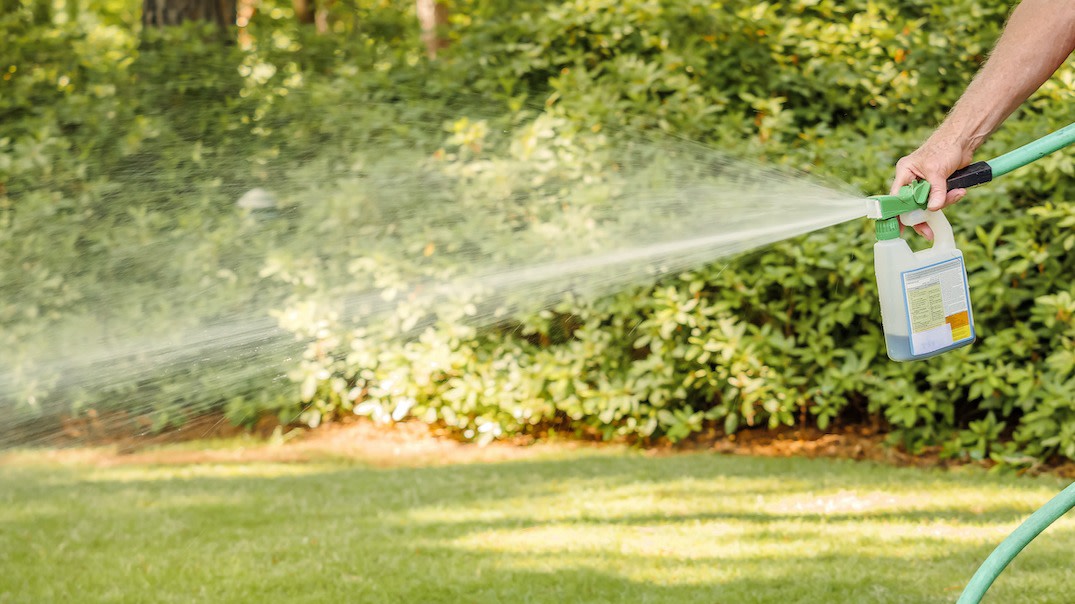Herbicides Guide: Everything to Know About Weed Killers
Written by MasterClass
Last updated: Dec 8, 2021 • 4 min read
Weed control can be one of the most challenging parts of gardening—here’s everything you need to know about weed killers, or herbicides.
Learn From the Best
What Are Herbicides?
Herbicides, commonly called weed killers, are solutions that stop the spread of—and eventually kill—weeds. Herbicides hamper weed growth by interfering with photosynthesis and cell division; reducing nutrient uptake; slowing protein, lipid, or sugar synthesis; and blocking root formation. Weeds can be more than landscaping eyesores: They choke flowers, vegetation, and other plants, robbing them of the nutrients they need to survive and flourish. Herbicide use can help preserve plants by protecting cultivated areas and keeping them weed-free.
Herbicides are a common part of commercial agriculture, especially in edible crop production. Manufacturers developed herbicide-resistant crops to enable wider use of strong herbicides. However, many weeds eventually develop resistances to particular herbicides, forcing farmers to use stronger concentrations or different doses. For example, there are many weeds in soybean, corn, and sorghum production that are now glyphosate-resistant.
Herbicides are also related to pesticides and insecticides, which are pest management solutions that stop the spread of and kill harmful insects.
Types of Herbicides
In general, there are two herbicide modes of action: translocation (in which the herbicide spreads throughout the weed) and site-specific action (in which the herbicide stays at the point of contact). Herbicides target different plant functions, making them more or less effective for different weed species:
- EPSPS inhibitors and ALS inhibitors: Like metsulfuron-methyl, these inhibitors deny plants of essential amino acids.
- Auxin-like herbicides: These kill weeds by mimicking growth regulator hormones at several sites of action in the cell wall.
- ACCase inhibitors: These target plant enzymes to weaken cell membranes.
- Contact herbicides: This kind of herbicide burns plant tissue.
- Photosystem inhibitors: This type decreases photosynthesis.
Commercial Herbicides vs. Home-Remedy Herbicides
Biochemical weed killers (also called commercial weed killers) are herbicides made with chemicals that are usually toxic, and the formulations can be dangerous when they come into contact with your skin. Common active ingredients in chemical herbicides include glyphosate, atrazine, dicamba, paraquat, triazine, diquat, glufosinate, metolachlor, urea derivatives, trifluralin, and surfactants. Check local regulations and research from the US Environmental Protection Agency (EPA) and USDA before using new herbicides at home.
On the other hand, home remedy herbicides contain products you have at home (sometimes chemicals or other natural ingredients), including high concentrations of bleach, vinegar, baking soda, and boiling water. While you should still handle these ingredients with care, they are not as dangerous as some of the chemicals in commercial herbicides.
Selective Herbicides vs. Nonselective Herbicides
Selective weed killers attack only certain species, leaving desirable plant species or crops safe; some selective weed killers may target only broadleaf weeds or only annual grass weeds. Nonselective weed killers, also called total weed killers or broad-spectrum herbicides, will kill all plant growth they come into contact with, not just weeds.
Pre-Emergent Herbicides vs. Post-Emergent Herbicides
Pre-emergent weed killers are a group of herbicides that usually come in the form of preplant soil-surface treatments and can target weeds or weed seeds before germinating or blooming. Meanwhile, post-emergent weed killers target weeds after they bloom and typically come in the form of foliar sprays.
When to Use Herbicides
Strong chemical herbicides can be dangerous to use due to ecology concerns about toxicity, persistence, leaching, eventual herbicide resistance in weeds, and groundwater contamination, so most gardeners opt to use herbicides only sparingly. Before you use chemical herbicides to control weeds, try natural methods first—including tillage, manual weed removal, and home remedies.
How to Use Herbicides
To safely use herbicides in your garden, follow these steps:
- 1. Choose the right herbicide for your situation. Before you go out and purchase an herbicide, conduct research to identify the best solution for your yard. Various types of weeds respond differently to different herbicides. Identify what type of weeds are growing in your yard, paying special attention to lists of herbicide-resistant weeds that may not be affected by chemical sprays. In addition, be aware of your surrounding landscaping plants and whether or not certain herbicides may do them harm. You may opt for a high-strength chemical herbicide or a home remedy made from products you already own.
- 2. Apply the herbicide to the area. During herbicide application, protect your skin from potential herbicide toxicology by wearing pants, long sleeves, and gloves, and then apply the herbicide according to the specific recommendations—whether it’s a home mixture or a packaged weed killer with a sprayer. Before you apply a commercial herbicide, read the product label to ensure you use it properly. In general, to achieve optimal results, treat your yard in the late spring or early summer right after the weeds first sprout; when weeds are still young, they’re typically much easier to kill.
- 3. Re-treat if necessary. Depending on the type of herbicide, it will generally take one to three weeks to see visible results. For effective control, you may need to apply more than one treatment of herbicide. If your first treatment fails to kill all the weed species and you don’t re-treat, the weed will grow back in the upcoming weeks or in the following growing season.
- 4. Practice proper landscaping care. Maintaining healthy landscaping is a great way to make weed management practices more effective. Mow and prune regularly to keep your plants healthy and thriving, use mulch to suppress weed growth, practice early-season tillage to break up the soil, and pull up individual weeds as they sprout to avoid letting them spread.
Learn More
Grow your own garden with Ron Finley, the self-described "Gangster Gardener." Get the MasterClass Annual Membership and learn how to cultivate fresh herbs and vegetables, keep your house plants alive, and use compost to make your community—and the world—a better place.
